Antonio Martínez Ron – elDiario.es
When we think of communication between living things in nature, our human bias brings to mind the multitude of visual and audio signals exchanged between animals and plants. But beneath this more obvious layer lies an immense network of chemical signals that, although we cannot see them, regulate the functioning of ecosystems.
 Over the past twenty years, biologist and director of the Max Planck Institute for Chemical Ecology, Bill Hansson, has studied the mechanisms by which insects and plants communicate and has seen first-hand how human activity is disrupting these delicate balances. In his book A Matter of Smell (Crítica, 2023), Hansson details the importance of smells in nature and offers us a fascinating review of the role of smell in evolution. He attends us by videoconference from his home in Jonstorp, Sweden, before going fishing.
Over the past twenty years, biologist and director of the Max Planck Institute for Chemical Ecology, Bill Hansson, has studied the mechanisms by which insects and plants communicate and has seen first-hand how human activity is disrupting these delicate balances. In his book A Matter of Smell (Crítica, 2023), Hansson details the importance of smells in nature and offers us a fascinating review of the role of smell in evolution. He attends us by videoconference from his home in Jonstorp, Sweden, before going fishing.
In your book you cite the Anthropocene, have we also altered the smells of the planet?
Of course, we have. When we talk about the gases we are emitting, we only think about CO2 which is changing the temperature and the climate, but if you think about [tropospheric] ozone, you will see that it is one of the biggest oxidisers. That means it changes all the molecules that have a double bond, which includes everything that smells. And that’s what we’ve seen in many studies. We’ve just published a paper in which we describe how insects don’t find each other to mate because of this. The males no longer smell like they should and are trying to mate with each other, rather than with the females. Everything is being altered because things no longer smell the way they should and this includes the smell of flowers. We are changing the smell landscape of the Earth and things smell different, that’s for sure.
Can it be said that the planet now smells ‘human’?
Well, anthropogenic smells, because it is our activities that change the way things smell. And what we emit into the atmosphere also smells, like the smoke from diesel engines or factories. The whole planet is changing the way it smells, as are many other things.
How are floating plastics fooling the sense of smell of seabirds, for example?
Animals that live in the ocean and forage for fish, like birds, seals, and whales, use the smell of phytoplankton which is dimethylsulphide (DMS) because that is what the rest of the chain depends on and tells them when food is present. But when all this huge amount of plastic that is now floating adrift decomposes, the gas it emits is precisely this DMS. The consequence is that animals think it’s a good place to fish, they find this waste and eat it. This is why there are so many birds and fish with stomachs full of plastic.
Rather than visual or auditory, is most communication between living things chemical-olfactory?
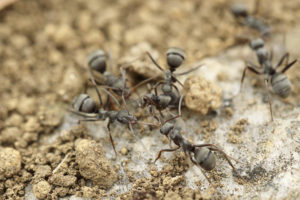 For many animals, and also a little for us, smell is very important. For some, like insects, it is a vital issue. There is another good example of the effects of the Anthropocene; we have done experiments with ants which, as you know, have a smell for each anthill, and that’s how they recognise each other. When they come back to the nest, if they don’t recognise their smell, the other ants kill them. We take an ant from the colony, expose it to ozone for an hour and, when it comes back, they kill it because it doesn’t smell as it should. This shows that changes in smell have a profound effect on how animals interact.
For many animals, and also a little for us, smell is very important. For some, like insects, it is a vital issue. There is another good example of the effects of the Anthropocene; we have done experiments with ants which, as you know, have a smell for each anthill, and that’s how they recognise each other. When they come back to the nest, if they don’t recognise their smell, the other ants kill them. We take an ant from the colony, expose it to ozone for an hour and, when it comes back, they kill it because it doesn’t smell as it should. This shows that changes in smell have a profound effect on how animals interact.
When we think of communicating with beings from other planets, we always think in visual terms. Should we have sent a message with smells on the Voyager probes?
We are too visual and our imagination is limited when it comes to smells. Indeed, these civilisations could communicate molecularly, through chemical signals, and that could mean things. I think you’re absolutely right, we should have sent the collection of human smells in that capsule.
What is the smell of Proust’s madeleine effect for you?
I was in Athens, Greece, in 1984. It was very hot and there was a market nearby with a smell of slightly rotting meat. I didn’t think much about it then, but thirty years later I was at my university in Sweden on a very hot day, and I smelled the exact same smell, and suddenly I was in that place in Athens. I didn’t even remember the place, but it was like magic, I was in front of that butcher’s shop, the typical Proust moment, with a slightly less pleasant smell. The interesting thing is that the smell triggers memories you didn’t even know you had. It activates the visual memory, it’s really fascinating.
You say in your book that flies reject bad fruit by detecting geosmin, which is also in the smell of rain.
These flies are looking for fruit to be in a very specific state before it starts to rot. And with their olfactory system they can discriminate which is the perfect state, but this smell – which is the same as the smell of rain – is also emitted by poisonous organisms so they avoid it. There is a line in the brain of these flies to avoid that smell. If their antenna cells are activated, they get the “stop” signal, like if you put your hand near something very hot and instinctively pull it away.
Tell me about those flies that cure themselves of a disease equivalent to Parkinson’s disease by eating fruit that they detect thanks to their sense of smell.
Yes, it’s the Drosophila seheilla fly, which feeds on fruits called nonis, which smell like a mixture of gorgonzola cheese and pineapple, a very strange mixture of acids. And when they start to decompose, that’s when it eats them. One of the things you see in the lab is that if you feed these flies the same food you feed the rest of them, they do extremely badly, they can’t even lay eggs. But if you supplement their diet with this fruit, they recover.
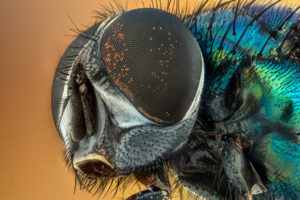 We started looking at it and it turns out that this fruit contains a lot of L-DOPA and the flies have a genetic problem: they need to eat this fruit – just like we need to ingest vitamin C and we don’t synthesise it. Maybe during evolution, because they were only constantly eating this fruit, that gene for generating dopamine mutated and nothing happened, because the flies were getting this L-DOPA from their diet. And that’s why, in part, their olfactory system is totally focused on detecting this fruit. They’ve sacrificed the rest of the system, they have a specialised nose to detect this smell between gorgonzola and pineapple.
We started looking at it and it turns out that this fruit contains a lot of L-DOPA and the flies have a genetic problem: they need to eat this fruit – just like we need to ingest vitamin C and we don’t synthesise it. Maybe during evolution, because they were only constantly eating this fruit, that gene for generating dopamine mutated and nothing happened, because the flies were getting this L-DOPA from their diet. And that’s why, in part, their olfactory system is totally focused on detecting this fruit. They’ve sacrificed the rest of the system, they have a specialised nose to detect this smell between gorgonzola and pineapple.
Can we differentiate the smell of a happy person’s sweat from that of a frightened person?
Yes, but we are not good at doing it consciously. Unconsciously, however, we can do it, because when you get stressed your smell is different. It’s the case with my daughter, for example, when she starts to smell onions, I know she’s stressed.
We always think of dogs trained to smell substances, but can you train insects?
We use all kinds of animals. I have also written about the rat that won a medal for finding landmines. The problem with insects is that they live very short lives. There is a company in France that trains bees to detect TNT in airports. What they do is they give them a little bit of sugar when they find the explosive and after two or three times, the bees will stick out their tongue when they are close and anticipate. So you put three bees and a laser that detects this tongue movement and tells you the presence of the TNT. The problem is that you need a continuous supply of bees. The US military has some insect programmes through DARPA and has invested a lot of money. The idea is to release swarms of insects and wait for them to land on what you are looking for.
Odours are being used as an insect control strategy, so what is the push-and-pull technique?
It’s an amazing story. Working in Central Africa, some specialists saw that maize, which had been brought from America, became the most important food, but some local insect species learned to eat it and devastated the crops. In the end, trying to “think like an insect”, which is what I tell my students, they looked for the food they liked the most, the one they had evolved with, and it was a local grass. It smelled so good to them, that if they put it around the crops, they left the corn alone. And at the same time they planted a kind of bean among the corn that insects were repelled by it. So they pushed the pests away and got the production back without any chemicals, just by knowing the insects and planting different species of plants. The inhabitants of the area, near Lake Victoria, have even performed dances to celebrate this sukuma-vuta (which is the name of the strategy in Swahili). This is green chemistry and the life-changing science of smell in action.
You have studied moths well – how many molecules can one of these insects detect from a distance?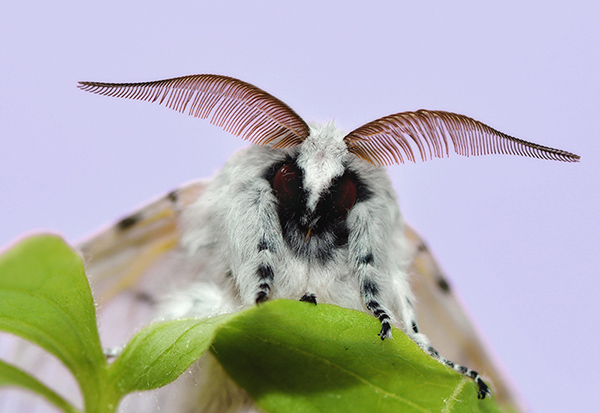
To give you an idea, it’s like if you dumped a packet of sugar into the Baltic Sea and were able to tell that it was sweeter. That’s the level of detection they have. In a sample the size of a sugar cube, moths can detect between one and ten molecules, whereas we, for the compound we are most sensitive to, need 200 million molecules to detect a smell. Their sense of smell is millions of times more sensitive than ours.
Like eels or salmon, these species have capabilities we can’t even imagine, don’t they?
That’s our problem: we can’t imagine the olfactory world of these animals, because we can’t do that. One of these male moths can be two kilometres away from the female and detect her scent, when the amount emitted by the female, in one hour, takes up one point of type on a printed page. This scent travels in the wind for a distance of two kilometres and the male can detect it. It is fascinating and beyond our understanding.
Could it be that many of the experiments we do with animals are not understood precisely because their world is so olfactory and different from ours?
Of course, we are. And we forget. We have already seen that in some experiments with mice if different people come into the lab who smell different, they change their behaviour. These are things that we don’t think about very much. And again, it’s because of our limitations in thinking outside the box and imagining the mental world of other animals.
How come a mouse has four noses?
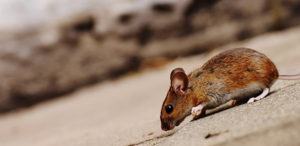 Because everything in their life depends on smells. So they have channels for different kinds of smells, which detect different kinds of molecules. Like the one on the tip of their nose, which only detects smells of danger, the smell of a cat, for example. That part is just for that.
Because everything in their life depends on smells. So they have channels for different kinds of smells, which detect different kinds of molecules. Like the one on the tip of their nose, which only detects smells of danger, the smell of a cat, for example. That part is just for that.
What is schreckstoff?
It’s a smell that has been identified mainly in fish. It is known that there are special cells in their skin that when they are damaged by the bite of another fish, they dissolve in the water and the other fish that detect it, run away. Because they are frightened. But it has also been shown that if this substance is poured into the water, the fish change their morphology and become wider so that they are more difficult to be eaten by the bigger fish. It is an amazing effect of these compounds.
What mechanism explains why some flowers end up smelling like corpses?
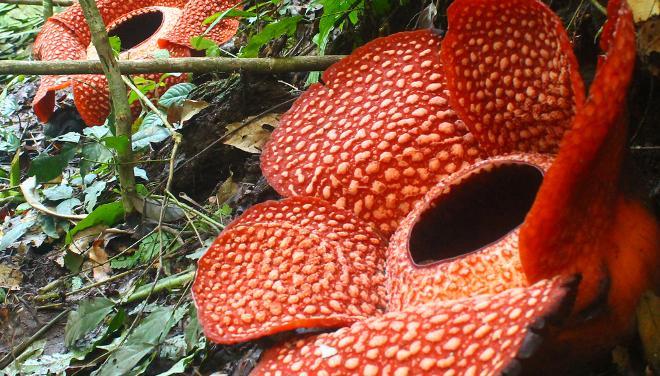
There are two irresistible urges in insects. For the male, it is to find the female. For the female, to find a place to lay her eggs because it is essential to lay them before she dies so that there will be another generation. And this can be exploited by others. Some plants emit molecules that mimic sex pheromones to attract pollinators and others that mimic the signal that attracts them to lay eggs. In the case of corpse-scented flowers, the plants take advantage of this mechanism and obtain pollination without offering anything; the flies do not get nectar in return. They get it for free.
Should science bring the sense of smell to the forefront?
We are an interrelationship between what we see, hear, and smell. Everything is a mixture of stimuli and it is interesting to know that in some cultures smell is so important that they have special words for smells. We have words for colours, but not for smells. We always talk about the smell of vanilla or banana, for comparison. There is a group in Malaysia, the Jahai, who have a specific word for ‘tiger pee smell’. Because for them it is important to know where they have passed through.
So is smell more important in our lives than we think?
Undoubtedly, although there are few smells that we consciously recognise and many that are very powerful but of which we are not aware. All these smells we produce and the smells we put on ourselves are our identity. You build an identity with the smells you choose because you like them, smell is very important for the interaction between people.
Translation – FUNCI
This post is available in: English Español


